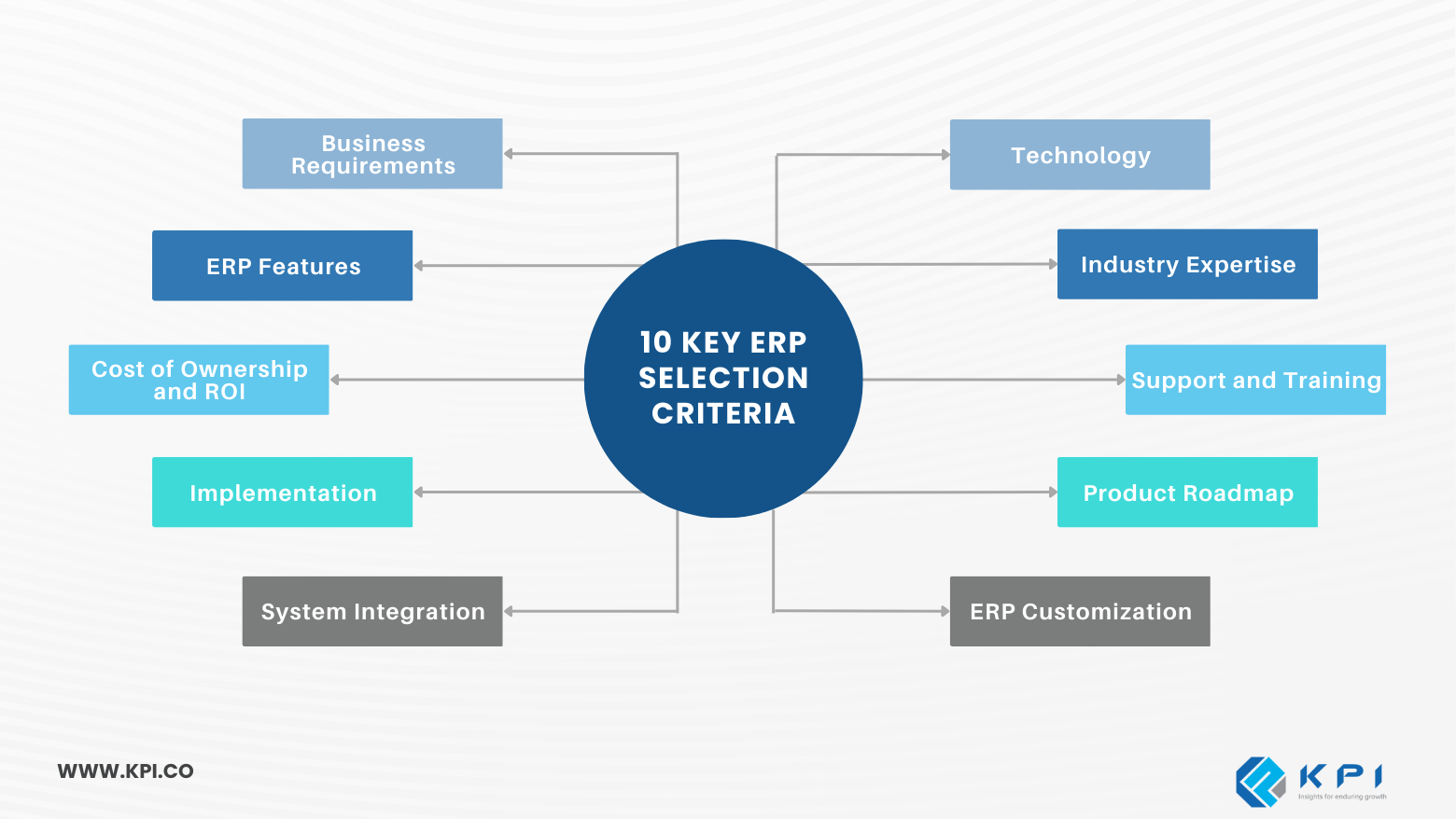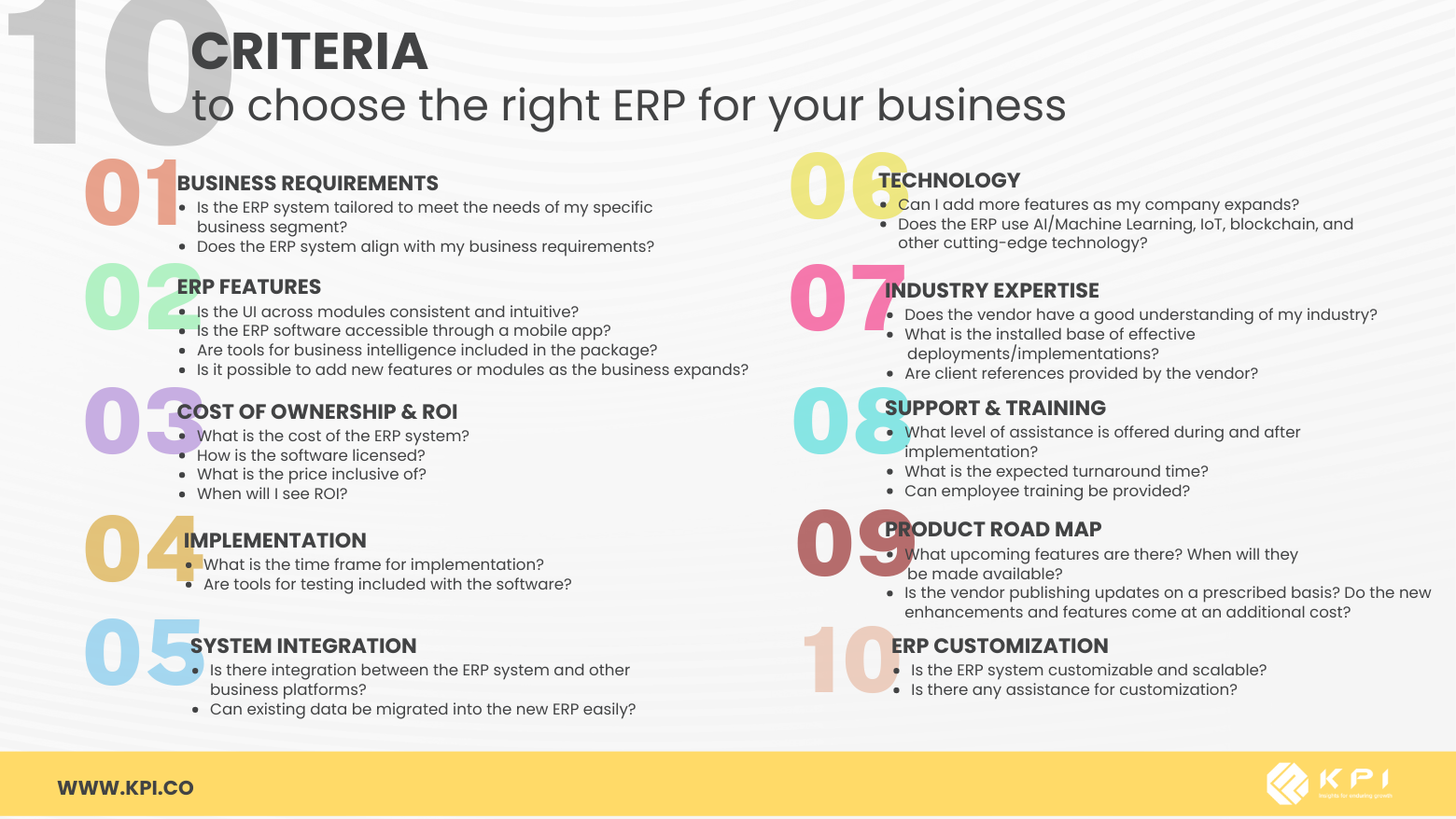
10 Criteria to Choose the Right ERP for Your Business
Updated on : 17 May 2023
Published : 16 Feb 2023
KPI

TABLE OF CONTENTS
TABLE OF CONTENTS
Enterprise Resource Planning (ERP) are critical for companies to manage their businesses efficiently. The right ERP implementation can help streamline operations, improve customer satisfaction, and drive growth. However, with so many ERP systems available in the market, choosing the right one can be a challenge.
In this blog, we will outline 10 important criteria to consider when selecting an ERP system.
What are the 10 Key Criteria?

Business Requirements
Consider the size of your organization, the types of services you offer, and your specific industry requirements. With clear goals and metrics in place, you can measure the real ROI of your investment and take your business to new heights. The vendor you choose should be able to provide an ERP solution that aligns with your unique business needs.
ERP Features
A good ERP system should have the necessary features to support your business operations. This includes financial management, inventory management, supply chain management and more. Consider which features are most important to your organization. Make sure the vendor you choose can provide them.
Cost of Ownership and ROI
The cost of an ERP system can be significant, so it's essential to consider the return on investment. Evaluate the total cost of ownership. Keep in mind the software licensing fees, implementation costs, and ongoing maintenance expenses.
Implementation
The vendor is your implementing partner. It's important to know the timeline and resources required to get your ERP system up and running. Ask questions such as how long the implementation process will take. With KPI’s NetSuite Implementation, you can trust in a smooth and efficient implementation process. This will help you reach your business goals as soon as possible.
System Integration
Verify its ability to integrate with your existing systems and applications. A leading ERP should not only bring business processes together but also seamlessly integrate with any technology you want to continue using. In line with this, data migration is also important. Look for an ERP with real-time synchronization of data across systems. This way, you can ensure that your data is always up to date and your business runs efficiently.
Technology
Make sure that the technology is up-to-date and scalable to meet your future needs. The integration of cutting-edge technologies like cloud, AI/Machine Learning, IoT, blockchain and augmented reality has greatly enhanced the capabilities of ERP systems. These technologies provide improved analysis, insights, and personalized experiences. This leads to better informed decision making and streamlined processes.
Vendor Industry Expertise
When choosing an ERP vendor, evaluate their expertise in your industry. Look for a vendor with a successful history of similar ERP installations, good references and financial viability for future support. Industry expertise is key for a smooth implementation and an effective solution.
Support and Training
Evaluate the vendor's expertise and guaranteed response time. Consider managed support options for a successful adoption. The level of support and training that the vendor offers is also important. This includes documentation, online resources, and employee training.
Vendor and Product Roadmap
A good ERP vendor should have a clear product roadmap that outlines their plans for future development and upgrades. Evaluate the vendor's plans for improving their product through new versions and features. This will help ensure the ERP system meets your growing business needs.
Customization
The ERP system should be customizable to meet your specific requirements. Assess your current and future customization needs. The complexity of business processes and type of cloud deployment (single tenant vs. multitenant) can impact customization capabilities.
What are the important questions to ask?
Business Requirements
- Is the ERP system tailored to meet the needs of my specific business segment?
- Does the ERP system align with my business requirements?
ERP Features
- Is the UI across modules consistent and intuitive?
- Is the ERP software accessible through a mobile app?
- Are tools for business intelligence included in the package?
- Is it possible to add new features or modules as the business expands?
Cost of Ownership and ROI
- What is the cost of the ERP system?
- How is the software licensed?
- What is the price inclusive of?
- When will I see ROI?
Implementation
- What is the time frame for implementation?
- Are tools for testing included with the software?
System Integration
- Is there integration between the ERP system and other business platforms?
- Can existing data be migrated into the new ERP easily?
Technology
- Can I add more features as my company expands?
- Does the ERP use AI/Machine Learning, IoT, blockchain, and other cutting-edge technology?
Vendor industry Expertise
- Does the vendor have a good understanding of my industry?
- What is the installed base of effective deployments/implementations?
- Are client references provided by the vendor?
Support and Training
- What level of assistance is offered during and after implementation?
- What is the expected turnaround time?
- Can employee training be provided?
Vendor and Product Roadmap
- What upcoming features are there? When will they be made available?
- Is the vendor publishing updates on a prescribed basis? Do the new enhancements and features come at an additional cost?
Customization
- Is the ERP system customizable and scalable?
- Is there any assistance for customization?

The Wrap
Choosing the right ERP solution is essential for the success of your business. By considering these 10 key selection criteria, you can ensure that you are making an informed decision and maximizing your investment.
When it comes to implementation, KPI is a trusted and reliable NetSuite ERP provider that can help you achieve your business goals. Make the smart choice for your business and start your ERP journey with KPI today.
